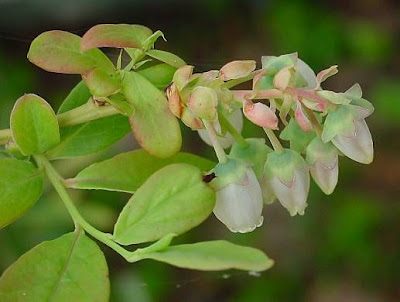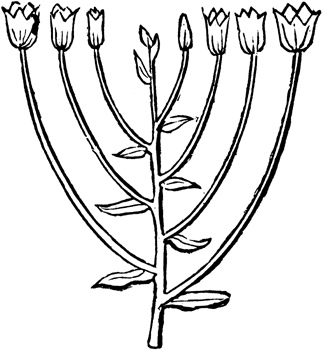Get to Know the Highbush Blueberry
 When
you go to the supermarket and buy yourself some
blueberries, there is a good chance that you are picking
yourself up some delicious highbush blueberries or a hybrid
version of them (especially in
the northern regions of the United States). Vaccinium
corymbosum, the highbush blueberry, and Vaccinium
australe (found primarily in the southern regions of the
United States) are the two dominant species of blueberries that
are sold commercially in the United States. Most 'highbush'
blueberries are actually hybrids of those two species, plus
other minor species. The highbush
blueberry has many alternative names, including:
Northern highbush blueberry, Southeastern highbush blueberry,
Maryland highbush blueberry, black highbush blueberry, American
blueberry, New Jersey blueberry, rabbiteye blueberry, swamp
blueberry, tall huckleberry, mayberry, and whortleberry.
The common name 'highbush blueberry' simply refers to the blue
fruit that is located relatively high on the 'bush.'
When
you go to the supermarket and buy yourself some
blueberries, there is a good chance that you are picking
yourself up some delicious highbush blueberries or a hybrid
version of them (especially in
the northern regions of the United States). Vaccinium
corymbosum, the highbush blueberry, and Vaccinium
australe (found primarily in the southern regions of the
United States) are the two dominant species of blueberries that
are sold commercially in the United States. Most 'highbush'
blueberries are actually hybrids of those two species, plus
other minor species. The highbush
blueberry has many alternative names, including:
Northern highbush blueberry, Southeastern highbush blueberry,
Maryland highbush blueberry, black highbush blueberry, American
blueberry, New Jersey blueberry, rabbiteye blueberry, swamp
blueberry, tall huckleberry, mayberry, and whortleberry.
The common name 'highbush blueberry' simply refers to the blue
fruit that is located relatively high on the 'bush.'
The name Vaccinium corymbosum is derived from Latin.
Vaccinium is the ancient Latin word for bilberry, and
corymbosum means 'full of corymbs.' A corymb is
a cluster of flowers coming off of the stem that grow to the
same height, creating a 'flat top.'

Notice the way the flowers line up in a corymb.
Now that you know a little bit about the Vaccinium corymbosum, learn about how it is classified on my Classification page.
Find out about other interesting food organisms on the Multiple Organisms site.

